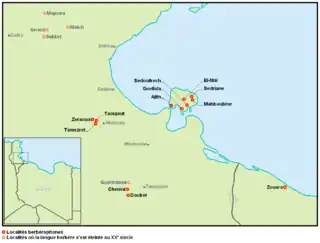| Zuwara | |
|---|---|
| Twillult | |
| Native to | Libya |
| Region | Zuwara |
| Language codes | |
| ISO 639-3 | None (mis) |
| Glottolog | tuni1262 |
 Berber-speaking areas belonging to Kossmann's "Tunisian-Zuwara" dialectal group | |
Zuwara Berber or Twillult language (also: Zuara, Zwara, (Berber name: Twillult, ⵝⵡⵉⵍⵍⵓⵍⵝ) is a Berber dialect, one of the Berber Zenati languages. It is spoken in Zuwara city, located on the coast of western Tripolitania in northwestern Libya.
Several works of Terence Mitchell, most notably Zuaran Berber (Libya): Grammar and texts,[1] provide an overview of the language's grammar along with a set of texts, based mainly on the speech of his consultant Ramadan Azzabi. Some articles on this subject were also published by Luigi Serra.[2]
The speakers refer to their specific variety of the language as twillult /t.ˈwil.lult/ ‘the language of Willul’, and the word "Mazigh" /ˈma.ziʁ/ may refer both to the wider Amazigh language or to any Amazigh person.[3] Although rare for a Berber idiom, the masculine form is used to refer to the language.
Ethnologue considers this language a dialect of Nafusi, although the two belong to different branches of Berber according to Kossmann (1999).[4]
Number of Speakers
By some estimates, 297,000 people speak Zuwara Berber or a similar dialect. Approximately 247,000 of these speakers reside in Libya.[5]
Writing System
This language uses the Naskh variant of the Arabic script.[5]
Phonology
Zuwara Berber has many consonants compared to vowels. However, words can end in both consonants and vowels. For instance, the Latinized words "ˈa.man" and "ˈa.nu" mean "water" and "water well" in English, respectively.[3]
Consonants
Zuwara Berber has a total of 31 consonants.[3]
| Labial | Alveolar | Palatal | Velar | Uvular | Pharyngeal | Glottal | |
|---|---|---|---|---|---|---|---|
| Plosive | b | t, tˁ, d, dˁ | k, g | q | |||
| Nasal | m, mˁ | n, nˁ | |||||
| Fricative | f | s, sˁ, z, zˁ | ʃ, ʒ | χ, ʁ, ʁˁ | ħ, ʕ | ɦ | |
| Approximant | w | r, rˁ | j | ||||
| Lateral | l, lˁ |
Vowels
Zuwara Berber has a total of four vowels: /i/, /u/, /ə/, and /a/.[3]
Prosody
Stress
In roughly 85% of words, the stress goes on the penultimate syllable, especially for native Zuwara Berber words. For instance, the Latinized word "a.ˈzi.zaw" means "green" in English and has three syllables. Thus, the stress is on the second syllable, "ˈzi".[3]
References
- ↑ Mitchell, Terence Frederick (2009). Zuaran Berber (Libya): Grammar and Texts. Köln: Rüdiger Köppe.
- ↑ Serra, L. (1964). "Testi berberi in dialetto di Zuara". Annali dell'Istituto Orientale di Napoli, NS. 14: 715–726.
- 1 2 3 4 5 Gussenhoven, C. (2018). "Zwara (Zuwārah) Berber" (PDF). Journal of the International Phonetic Association. 48 (3): 371–387. doi:10.1017/S0025100317000135. S2CID 151806242.
- ↑ Kossmann, Maarten (1999). Essai sur la phonologie du proto-berbère. Köln: Rüdiger Köppe. pp. 28, 32. ISBN 978-3-89645-035-7.
- 1 2 "Nafusi". Ethnologue. Retrieved 2022-11-04.